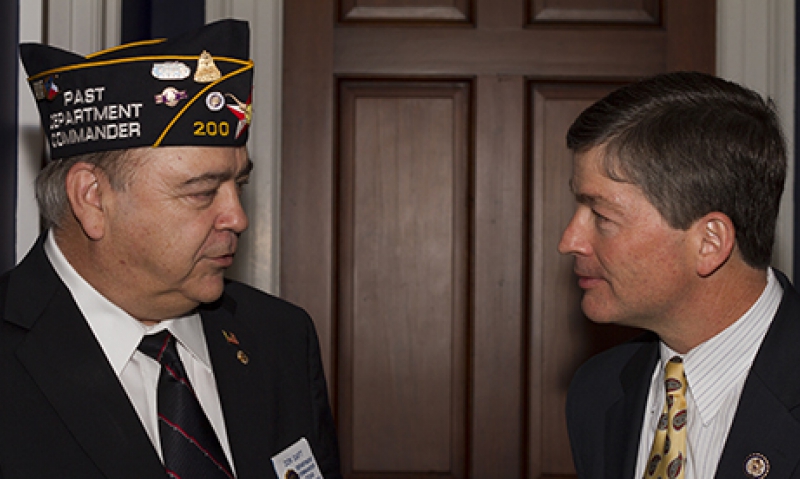
Supercommittee members hear from Legion
On Nov. 2, 42 members of The American Legion met with the 12 senators and representatives who comprise the Joint Congressional Deficit Reduction Committee, commonly called the "supercommittee" to express the organization's views and concerns about the deficit reduction plan with it comes to matters of national security and veterans benefits.
"We brought their constituents to the members of the supercommittee as a lobbying force," said Tim Tetz, the Legion's Legislative Division director. "Legionnaires from each of the states represented by the committee members were here to, in effect, personalize the impact of any actions committee members might take on any of the issues that The American Legion is concerned about. These include possible cuts to the budgets of the Department of Defense and the Department of Veterans Affairs, and any other measures that could weaken our national security."
Among the major concerns of The American Legion is the matter of "sequestration." If the bi-partisan supercommittee fails to reach agreement on the deficit reduction goals it has been charged with achieving by Nov. 23, the terms of last summer's federal budget deal require this action. It would mean, among other things, an automatic half a trillion dollars in cuts to the Defense Department alone. Secretary of Defense Leon Panetta recently called the idea "mindless," saying sequestration would "do catastrophic damage to our military and its ability to protect the country."
Legion lobbyists agree, as former National Vice Commander William Schrier pointed out in his Washington State delegation's morning meeting with Sen. Patty Murray, the supercommittee co-chair. Schrier talked of the dramatically negative effects of sequestration, which would virtually freeze defense assets.
I know what you're concerned about," Murray responded. "If we are not able to come up with some kind of compromise, sequestration is going to be devastating. I completely understand the challenges. You know where my heart and soul is. I am fighting every day to make sure the men and women who have served us get the support and services that they deserve. You know I won't forget that."
Murray then politely excused herself to get back to her work with her supercommittee co-chair, Rep. Jeb Hensarling of Texas. About 90 minutes later, as Hensarling returned to his office, the Legion delegation from Texas awaited him. Past Department Commander Don Daft asked the congressman if progress was being made in negotiations among supercommittee members.
"Well, just relying on the public record," Hensarling replied. "You know that there are a number of members (who) want to make pretty strong cuts in our national defense. That's not a surprise to anybody. You've all had experience negotiating with somebody, so you know that sometimes they don't show all their cards or what their intentions are."
Daft asked if it was possible for the supercommittee to avoid a deadlock. "Oh, of course," Hensarling said. "Look, I'm not going to give up hope until midnight on the 22nd, since we have to report out on the 23rd."
Legion lobbying groups from Arizona, California, Ohio, Maryland, Massachusetts, Michigan, Montana, Pennsylvania, South Carolina, Texas and Washington continued their Capitol Hill visits throughout the day.
